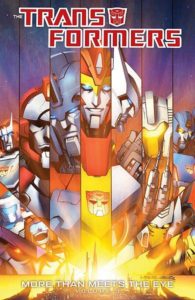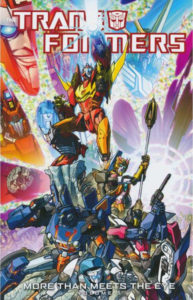 Most people who grew up in the US (or Canada, the UK or Japan) in the 80s (or 90s or 00s) will recognize the names Optimus Prime and Megatron. The iconic Transformers hero and villain have regularly appeared on toy store shelves, in cartoons and comics, and in licensed merchandise for over 30 years.
Most people who grew up in the US (or Canada, the UK or Japan) in the 80s (or 90s or 00s) will recognize the names Optimus Prime and Megatron. The iconic Transformers hero and villain have regularly appeared on toy store shelves, in cartoons and comics, and in licensed merchandise for over 30 years.
Over those years, the toy line has spawned a vast number of characters, most of whom are known only to those who collect vintage toys. These characters appeared only briefly in cartoons–or only in comics–or only in UK comics–or existed solely as biographies on the boxes of their toys.
So why are these “D-listers” the stars of More than Meets the Eye, an ongoing comic book that’s won a Comics Alliance Award for both Continued Excellence in Serial Comics and Outstanding Writer for its author, James Roberts?
More Than Meets The Eye doesn’t rely on the nostalgia factor to keep its readers coming back each month. It’s the character work that makes the story shine: casting alien robots as people, with very human flaws, each one with their own reasons for ending up aboard a spaceship on a quest into deep space in search of the Knights of Cybertron, who may hold the key to a better future. May. Assuming they even exist. And assuming the crew ever manages to find them.
The quest is an archetypal framework; the real story is in watching the characters interact.. This is where D-list characters come into their own. With very little in the way of pre-existing character development as constraints, the characters grew and evolved to suit the story–and, indeed, much of the plot comes about as characters make decisions and their actions in turn affect others. There’s Brainstorm, the erratic “mad scientist” (always in competition with Perceptor, the rational scientist) who’s prepared to build a time machine and stop the Great War before it starts…not for philosophical reasons, not for personal power, but in the hopes of rescuing an unrequited love. There’s Tailgate, who lay forgotten through the entire war, and fabricates his own history in his search for attention and friendship–of course it’s only a matter of time before his lies catch up to him, and even in the second season he remains vulnerable to the manipulations of someone who hopes to use him to further his own schemes. There’s Swerve, metallurgist by trade, who would rather spend the quest running the ship’s unofficial bar and who struggles against his private depression. And there’s Chromedome, a mnemosurgeon who can read and alter memories (at great risk to himself) and his troubled but ultimately loving relationship with Rewind, the ship’s historian.
 More than Meets the Eye is a comic that’s genuinely funny, deeply touching, sometimes tragic, always hopeful. It works because we genuinely care about these characters, wonder about their motivations, worry about their fates. This character work is possible because the creative team were freed from the constraints of what Transformers has so often been about–Optimus Prime and his heroic Autobots fighting against Megatron and his evil Decepticons in an endless robot war–and given the opportunity to explore what else the franchise could be. Over the course of the last few years we’ve seen the origins of the Great War, how it changed the characters, and how its aftereffects continue to shape the lives of beings who’ve spent so much of their lives in conflict. More Than Meets The Eye develops an alien society, with its own political movements and social classes and private concerns, and all this background comes out of how these factors affect the characters in the present.
More than Meets the Eye is a comic that’s genuinely funny, deeply touching, sometimes tragic, always hopeful. It works because we genuinely care about these characters, wonder about their motivations, worry about their fates. This character work is possible because the creative team were freed from the constraints of what Transformers has so often been about–Optimus Prime and his heroic Autobots fighting against Megatron and his evil Decepticons in an endless robot war–and given the opportunity to explore what else the franchise could be. Over the course of the last few years we’ve seen the origins of the Great War, how it changed the characters, and how its aftereffects continue to shape the lives of beings who’ve spent so much of their lives in conflict. More Than Meets The Eye develops an alien society, with its own political movements and social classes and private concerns, and all this background comes out of how these factors affect the characters in the present.
As of Volume One, the war is over and a bunch of nobodies (with a few semi-familiar names: Rodimus, Ratchet, Cyclonus and Ultra Magnus) are heading off into space on a fool’s errand–this is where the story begins. It doesn’t require much familiarity with previous iterations of the franchise, and indeed, for those who can set aside the fact that the concept began as a toy-based property, you may discover the best sci-fi comic you haven’t been reading.
A familiar name is not, in itself, reason to care about a character. Neither is a cool concept, an action-packed plot or a setting rich in possibility. It’s character development that turns names into people–flawed, struggling, believable people, each with their own scars from their pasts and dreams for their futures. There’s more to all of them than one would guess at first glance (hence the delightful suitability of the title) and as the story progresses, those layers are revealed. When we see characters as people, people we come to know, we become invested in them and their stories. When we see that their actions not only affect the plot but drive it forward, we care about what they do. And when we wonder and worry about what will happen to our favourites, we keep coming back–issue after issue, year after year. After four years and counting, More Than Meets The Eye‘s nobodies aren’t nobodies any longer.
About Mary:
